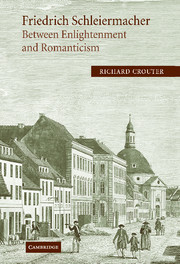Book contents
- Frontmatter
- Contents
- Acknowledgments
- List of abbreviations
- Introduction
- PART I TAKING THE MEASURE OF SCHLEIERMACHER
- 1 Revisiting Dilthey on Schleiermacher and biography
- 2 Schleiermacher, Mendelssohn, and the Enlightenment: comparing On Religion (1799) with Jerusalem (1783)
- 3 Hegel and Schleiermacher at Berlin: a many‐sided debate
- 4 Kierkegaard's not so hidden debt to Schleiermacher
- PART II SIGNPOSTS OF A PUBLIC THEOLOGIAN
- PART III TEXTUAL READINGS AND MILESTONES
- References
- Index
4 - Kierkegaard's not so hidden debt to Schleiermacher
Published online by Cambridge University Press: 14 January 2010
- Frontmatter
- Contents
- Acknowledgments
- List of abbreviations
- Introduction
- PART I TAKING THE MEASURE OF SCHLEIERMACHER
- 1 Revisiting Dilthey on Schleiermacher and biography
- 2 Schleiermacher, Mendelssohn, and the Enlightenment: comparing On Religion (1799) with Jerusalem (1783)
- 3 Hegel and Schleiermacher at Berlin: a many‐sided debate
- 4 Kierkegaard's not so hidden debt to Schleiermacher
- PART II SIGNPOSTS OF A PUBLIC THEOLOGIAN
- PART III TEXTUAL READINGS AND MILESTONES
- References
- Index
Summary
At age 64 and at the height of his fame Schleiermacher journeyed to Copenhagen where he was accorded full academic honors. This festive and elegant affair, which occurred on September 22–9, 1833, less than five months before his death, must have been extraordinary. The Copenhagen Post of 28 September vividly describes the German theologian's considerable achievements by observing:
A troubled Christendom has found in him an enthused proclaimer no less than an intellectual freedom in relation to superstition, fanaticism, and literalist authority. The mutual relatedness and well-executed connection of the various sciences are brought to expression in his personality as in his writings and no one has developed the limits of individual sciences with greater clarity or strength, especially the autonomy of theological science and its independence from an excessive speculation. His entire effectiveness manifests the union of science and life. It is no exaggeration if one considers Schleiermacher in many respects as the most significant theologian of our time in the Protestant church, whose uncommon spiritual power and originality are in innermost connection with a deep mind and living feeling. It is also no exaggeration if one believes that the church has had no greater theologian from the time of Calvin down to the present day.
After mention of Schleiermacher's masterful contributions to Plato studies and the study of ancient philosophy, it is further noted that “his whole effectiveness is so significant and influential, that he would have to be an object of interest for anyone, who did not wish to hold himself aloof from the most important movements of the age.
- Type
- Chapter
- Information
- Publisher: Cambridge University PressPrint publication year: 2005



